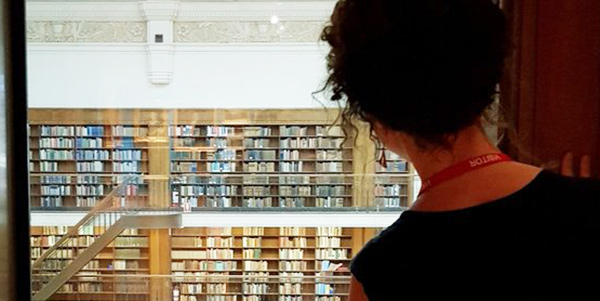March was a solid month for NSLA.
We completed end-to-end testing for our National edeposit (NED) system and were delighted to achieve sign-off on NED as a viable product. This is a huge milestone after more than two years of development work (we’ll keep you posted as we move toward launch later in the year).
We reached the half-way point in our pilot program for Aboriginal and Torres Strait Islander cultural competency training, with participants in all nine NSLA libraries completing online modules developed by AIATSIS and taking part in yarning circles to debrief and share thinking with peers. We collected a series of case studies from NSLA libraries about Indigenous collections and services to use in role-specific training.
The first of our triannual meetings for NSLA CEOs was held in Sydney, book-ended by opportunities to look at the NSLA program of work in the context of other GLAM sector and research endeavours.
NSLA March meeting
The March meeting of NSLA CEOs at the State Library of New South Wales covered:
- progress in building and testing the National edeposit (NED) service for electronic legal deposit materials, and feedback from publishers
- the establishment of a network for Aboriginal and Torres Strait Islander staff in NSLA libraries
- collaboration to celebrate the International Year of Indigenous Languages in the form of joint commitment to supplement Indigenous collection records in all NSLA libraries with AUSTLANG language codes (developed by AIATSIS), including a code-a-thon during NAIDOC Week
- continued rollout of Aboriginal and Torres Strait Islander cultural competency training for all staff in NSLA libraries following evaluation of the pilot in June 2019, and development of content and format for role-specific training
- continuing representation on the Australian Libraries Copyright Committee
- access to Australian standards through NSLA libraries
- comparison of methods for the valuation of library collections
- regional relationships (particularly in the Pacific).
NSLA continues to run communities of practice for copyright, visitor experience, digital preservation, digital archives, literacy and learning, corporate services, eresources, storage, and collections in NSLA libraries. The full NSLA program will be reviewed in July when CEOs meet at the Northern Territory Library in Darwin.
GLAM Peak
A meeting of the GLAM Peak committee was held at ALIA House in Canberra on 4 March, co-chaired by our own Liz Jack, CEO of Libraries Tasmania. Our shared priorities are best reflected in GLAM Peak’s position statements on digital collections, Indigenous cultural competencies, national research infrastructure and copyright law reform. The suite of position statements is in the PDF at the bottom of this page.
Matters agreed for collective advocacy included the abolition of crippling efficiency dividends for cultural institutions, and an increase in the number of small grants provided to community heritage organisations. These grants for equipment, research, administration or digitisation projects cost little and deliver a great deal for communities around Australia.
Both Sue McKerracher, CEO of ALIA, and Alex Marsden, National Director of AMaGA, made articulate and impassioned bids for support for our libraries and cultural institutions on ABC radio in the weeks following the meeting. ALIA has released a useful guide to Vote Library in the 2019 federal election.
Humanities research infrastructure
One of GLAM Peak’s priority areas is research infrastructure. The contribution of NSLA libraries here is large, but largely under the hood. The last week of March provided an opportunity to delve into this area with the second Humanities, Arts and Culture Data Summit of the Australian Academy of the Humanities. This was run conjointly with the third international Beyond Europe workshop for DARIAH (European Digital Research Infrastructure for the Arts and Humanities). The three-day event was hosted at the National Library of Australia.
The summit featured some excellent presentations from researchers demonstrating the varied ways in which they have used research data to drive social change, make other researchers’ lives easier, or to improve understanding in certain areas of inquiry. A particularly sobering example was the Colonial Frontier Massacres Map out of the Centre for 21st Century Humanities, presented by Dr Bill Pascoe. Professor High Craig (University of Newcastle) talked us through the ARC-funded Time-Layered Cultural Map of Australia. Professor Antoine Doucet (University of La Rochelle, France) presented the EU-funded NewsEye, a digital investigator for historical newspapers. Alison Dellit spoke about the myriad challenges of building and launching the extraordinary Australian Web Archive. Other presenters demonstrated tips and tools for data analysis and workforce skills development.
The data summit challenged participants to think about how well we are accommodating the needs of digital humanities scholars and encouraging new scholarship. What happens to research data when short-term project funding drops off and platforms can’t be supported? How can we ensure that research infrastructure for humanities resources receives the same level of support as for the sciences? How do we convey – to government and to a public audience – the importance of humanities research for human understanding, empathy and identity?
There are big questions about how openly accessible, re-usable, discoverable, connectable and citable our nation’s research data is, and about the sustainability of the systems that host it. NSLA will continue to work with our GLAM and research sector colleagues, reinforcing our common objectives for preservation and access to national heritage.
Barbara Lemon, NSLA Executive Officer










